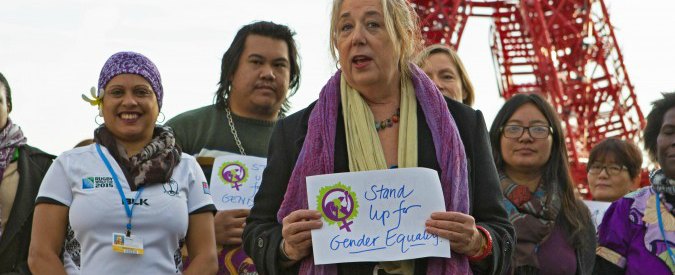
Gender equality: updates from COP21 Paris
The principle of Gender Equality: the situation emerging from the COP21 negotiations in Paris. Two days after the end of the COP21 negotiations it would appear that the principle of gender equality has a good chance of being included in various parts of the text of the Paris agreement.
In the draft published on December 8 the principle is referred to in paragraph 10 of the preamble, in Article 4 on adaptation, in Article 6 on climate finance and in Article 8 on capacity building. Moreover, as far as the COP Decision is concerned a reference to women and the gender perspective is present in provisions 77 and 80 on technological development and in provision 111 on implementation.
This may be considered a major achievement on the part of the UN Women and Gender Constituency, which, after the disappointment of the Lima Agreement began to intensify its advocacy. One of the main objectives the Constituency had established was an inclusion of the gender approach in a transverse manner within the document, having particular reference to mitigation, adaptation, climate finance, capacity building and access to technology.
The principle is not present in all key areas, but the inclusion in the preamble remains all the same a valid key for interpretation and implementation of the rest of the text. Furthermore, attention was drawn towards the non-presence of the principle in Article 2, which defines the purpose of the Treaty.
Unfortunately, the negotiations of the international agreements are in their entirety anything but predictable. The text may end up completely modified and the end result may differ quite considerably from the initial expectations. The truth is that even if it is not determined that the text should be reviewed in the subsequent negotiation sessions, one may never really know what will “survive” until the final version is agreed upon. In this regard, consideration should be given to the atmosphere in which the negotiations preceding the COP21 occurred and, in particular, the problems that arose during the development of article 2.
During this year’s ADP sessions difficulties were encountered between the parties as regards their acceptance of the inclusion of principles such as the protection of human rights and the promotion of gender equality within the negotiation text. Some countries, including Saudi Arabia, believe that this category of principles has nothing to do with climate change and that therefore it is inappropriate to deal with the two topics simultaneously. An antithetical stance is assumed by those countries that have adhered to the Geneva Pledge for Climate Action, a voluntary-base platform of states which recognize the implementation of human rights as an essential step in the process of effectively combating climate change.
The first time there was an explicit reference to human rights and gender rights in a climate agreement occurred with the Cancun agreement in 2009. The COP16 in fact felt the influence of the action of the Human Rights Council of the United Nations, which in the months preceding the conference had finalized a series of resolutions highlighting the link between human rights and climate change.
Resolution 10/4 concerning Human Rights and Climate Change is an example. In this document the impact of climate change on the enjoyment of human rights is acknowledged, particularly with respect to vulnerable groups. The preamble of the Cancun agreement was compiled, working in the same direction and opening a new frontier in the climate change debate. The difference in what is happening today lies in the binding nature of the new Paris agreement and in particular in the political value which Article 2 acquires in its definition of the scope of the Treaty. This provides an explanation of the resistance encountered in introducing once again principles relating to human rights, such as gender equality, in a climate agreement.
For all these reasons it is too early to be sure, but the situation is positive and seems to indicate a growing recognition of the link between gender issues and the fight against climate change which will be reflected in the new Paris agreement.
Chiara Soletti
Published for Italian Climate Network on the association’s website.
